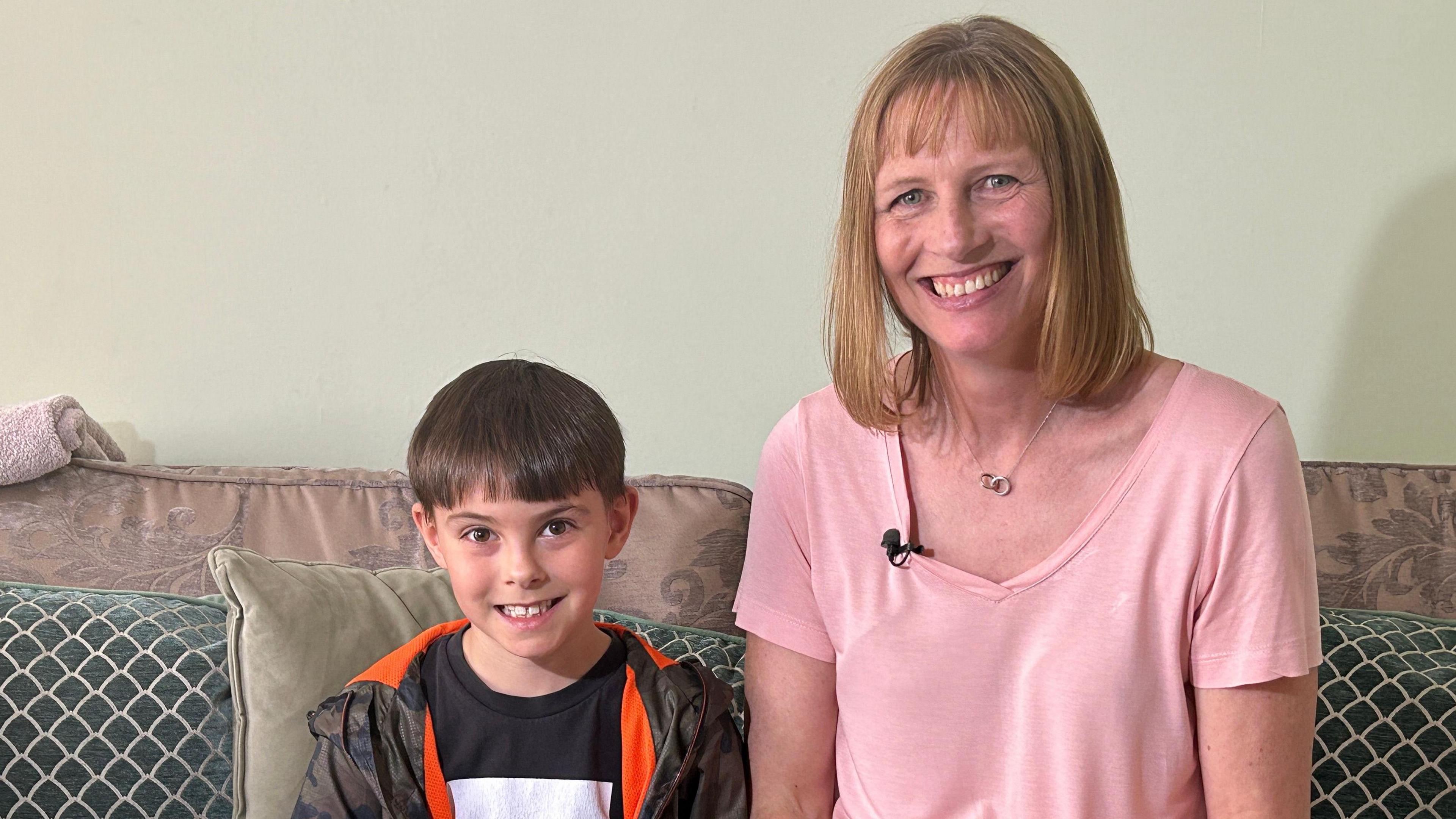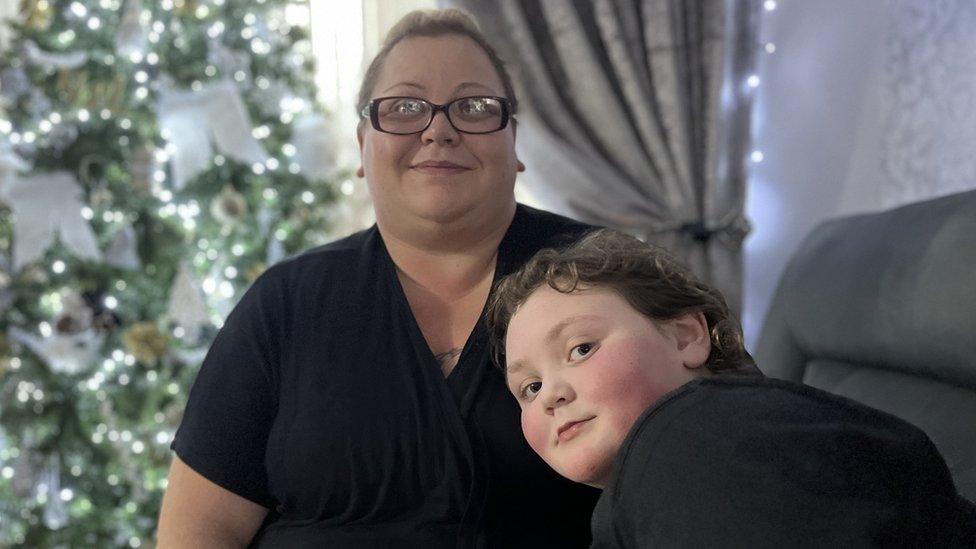Special educational needs system 'has burst'

Ruth says she could not find a suitable mainstream school for her eight-year-old son Samuel
- Published
Children with complex needs are being sent to private schools up to 200 miles away from home because there is not enough capacity in the state system, a BBC investigation has found.
Councils struggling to cope with an unprecedented number of children with special educational needs and disabilities (SEND) are increasingly reliant upon private providers.
Headteachers say funding from government has not kept pace with soaring demand, meaning both mainstream and special schools are struggling to cope.
As a result, local authorities say they are having to spend millions of pounds on independent providers which are sometimes located far away from the child's home.
When mainstream schools are unable to meet pupils' additional needs, an application can be made for that child to be granted an Education and Health Care Plan (EHCP).
These detailed legal documents spell out the support needed and oblige the child's local authority to provide it.
The number of children and young people with an EHCP in England stood at a record high of 600,000 in June - up 70% from January 2019.
During the last five years, the sharpest increase has been recorded in the north-west of England.
After requesting data from 25 councils in the region, the BBC has learned:
More than 5,000 pupils with EHCPs are being educated in schools outside their home borough
During the year to April 2024, 19 councils in the North West spent a combined total of £230m on independent school places for children with EHCPs
Using previous years' data, the BBC has calculated there has been a 45% increase between 2021-22 and 2023-24
During the 12 months to April 2024, there was a 16% rise
Twelve of the region's local authorities spent a combined £17m on transporting children to and from out-of-area schools
Some out-of-borough placements are more than two hours' drive away from the child's family home
A Department for Education spokesman said SEND children and young people had been "for too long let down", adding the government was "ready to speak to any council that is experiencing financial difficulties".

Supported by staff at an independent school specialising in helping autistic children, Samuel (right) builds a woodland den
Several parents told BBC News they had been forced to take their children out of mainstream schools because they could not accommodate their EHCPs.
Ruth said her eight-year-old son Samuel, who is autistic and has attention deficit hyperactivity disorder (ADHD), had not been in a classroom since January.
The Stockport mother explained that Samuel had previously been away from school for six months because his old primary had not been able to meet his needs.
While a specialist setting was eventually found for her son, Ruth said it still did not provide what was set out in his EHCP.
She said this had left her with no other option than to withdraw Samuel from his new school.
When she could not find an alternative, she resigned from her job.
This year, Ruth said she had spent most mornings at home with Samuel, where he now receives 12 hours of education each week under an Education Other Than At School (EOTAS) outreach package run by an independent school tailored for autistic children.
The costs are covered by Stockport Council, which spent nearly £14m on private school places during the 12 months to April.
The local authority's overall SEND deficit stands at £23m.
'Starved of funds'
Neighbouring Cheshire East Council spent £40m on 624 independent school placements in 2023-24 - an average cost of £64,000 per student.
It has a SEND deficit of £78m - the biggest in England.
Former council leader Sam Corcoran said: "The system is broken and it is breaking families and councils.
"Funding has not kept pace with demand and the number of special school places is vastly outstripped by the number of families with children needing one."
Mr Corcoran, who quit in July just before he was due to face a vote of no confidence over the state of the local authority's finances, claimed mainstream schools were "starved of funds" and "do not have the resources to cope".
The Labour councillor said this meant "too often, children are having to travel long distances to out-of-area placements".

Recently retired head teacher Martin Hanbury says special schools are facing huge pressures
Chatsworth High School and Community College is a state-funded academy in Salford which caters for students aged 11 to 19 who are autistic or have profound and severe learning difficulties.
Despite increasing capacity from 120 to nearly 200 students over the last decade, it is still over-subscribed.
Martin Hanbury, who retired as its head teacher after speaking to the BBC this summer, painted a bleak picture.
"Core funding for these children hasn’t increased in a decade," he said.
"There simply isn’t enough space to cater for the increasing numbers."
Andy is another parent who knows how tough it can be to find support.
He accompanies his 12-year-old son Noah on a 30-minute journey from where they live in Cheadle Hulme to a school in Macclesfield in neighbouring Cheshire.
Their local authority, Stockport Council, funds the placement.
"Noah missed his last nine months of primary school and it really affected his mental health," said Andy.
"We had situations where he’d cling to lampposts, climb on the roof, and we’d have to restrain him several times a day."

Noah, pictured with his sisters on either side of him, found life at mainstream school extremely difficult
Cole Andrew, a former special school head teacher and local authority SEND advisor, said staff at mainstream schools were having to support children with fewer resources than ever.
With special schools also at capacity, the education consultant said local authorities were being forced to pay for costly independent schools.
The shortage also means local authorities are having to search further afield.
During the last financial year, 17 councils in the North West arranged 5,220 out-of-borough EHCP placements, the highest on record.
A dozen local authorities spent £16.8m on taxi fares, transporting students to and from schools in other areas.
Cheshire West and Chester Council paid out £2.7m.
This included 200-mile, four-hour journeys to and from Beechwood College, an independent college in Glamorgan which specialises in providing education for people with autism.
'No magic wand'
In a statement, the Department for Education said: "We are focused on fixing the foundations of local government by rebuilding the sector from the ground up and stand ready to speak to any council that is experiencing financial difficulties.
"For too long, children and young people with SEND have been let down by a system that is not working and we are determined to tackle these issues head-on, improving children's life chances with better inclusivity and expertise within mainstream schools.
"There is no ‘magic wand’ to fix these deep-rooted issues, but we have already started with Ofsted reform, our curriculum review, and more training for early years staff, and will continue to act as quickly as possible to create the change that is so desperately needed.”
For Mr Hanbury, change cannot come soon enough.
"The system has burst," he said. "We have to make a decision as a society as to whether we want to educate these young people in the same way as they do in mainstream and more privileged schools."
Listen to the best of BBC Radio Manchester on Sounds and follow BBC Manchester on Facebook,, external X,, external and Instagram., external You can email your story ideas to: northwest.newsonline@bbc.co.uk
Related topics
Related Stories
- Published10 September 2024

- Published30 May 2024

- Published14 December 2023
